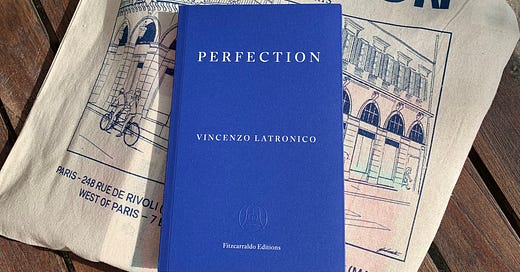You’re Not Lacking. You’re Just on Instagram.
Perfection™: Curated Lives, Filtered Misery, and the Lie of Fulfillment
Online brand strategist, or digital nomad? Oh, you gonna want to read Vincenzo Latronico’s Perfection.😮💨
Let’s repeat together: not everything needs to be a lifestyle. Always ask yourself, “What if the grass is just painted green?”
The Unbearable Lightness of Likes
Is it “authentic”? Are you feeling “fulfilled”?
Just kill me.
Remember, folks—if the grass looks greener, it’s probably fake.
There’s a certain kind of life that photographs well. A freelance job with a title like online brand strategist, houseplants in every corner, a Berlin apartment with light pouring through large windows, flat whites from a local roastery, and weekends in Lisbon (or dreaming about them). A life curated and posted, ambiently political, aesthetically intentional, quietly miserable.
Vincenzo Latronico’s novella Perfection holds up a mirror to that life—and it does not blink.
A Case Study in Curated Living
Anna and Tom are creative professionals in the vaguest, most contemporary sense of the term. Their job titles shift depending on the project—graphic designer, web developer, online brand strategist—but they’re always in English, even when they speak their own language. What they create are “differences,” aesthetics, vibes. Expats living in Berlin, they moved there in search of authenticity—a city still rough around the edges, still unfinished, still offering something “real.” Their work pays the bills, but it’s Berlin that defines them. The city is their main pastime, their aesthetic playground, their curated identity. They didn’t just move there; they chose it—over comfort, over convention, over wherever they came from.
Latronico describes them like this:
“The time that did not disappear through work was taken up by the city. Berlin was, to all intents and purposes, their main pastime – exploring it, understanding it, feeling part of it… They had fallen into the job. Berlin, on the other hand, they had chosen.”
From the outside, their lives look ideal. But inside their well-designed apartments and smooth-scrolling feeds, something is off.
The Instagram Spirituality of It All
They search for meaning in Instagram posts. They live on the dopamine hit of a well-performing selfie or protest poster. Latronico captures this with chilling precision:
“What was that rush they would get after a particularly popular post? And the itch that made them look up from their work every twenty seconds… to refresh the page and watch the number of likes clock up, as if it were a stock ticker or a scoreboard?… Fifty-year-old sociologists would talk about narcissism, but they were only talking about themselves.”
You don’t need to have a plant-filled apartment in Berlin to feel seen. You just need to have scrolled and refreshed and waited for a little hit of “You’re doing great, sweetie.”
Alienation in HD
Despite having good work, a strong relationship, and a vibrant social life, Anna and Tom are not fulfilled. Not even close. And yet, they can’t pinpoint why.
“From the outside, it was easy enough to identify the cause of their alienation, but to them, paradoxically, no explanation revealed itself.”
They inhabit a bubble—one that feels eerily familiar to many of us:
“Anna and Tom lived in a bubble, one even more insular and limited than those just starting to appear on social media. In a way, they had become radicalized. They spoke stumbling English with other non-native English speakers. They inhabited a world where everyone accepted a line of coke, where no one was a doctor or a baker or a taxi driver or a middle school teacher. They spent all their time in plant-filled apartments and cafés with excellent wifi. In the long run it was inevitable they would convince themselves that nothing else existed.”
It’s damning not because it’s exaggerated, but because it isn’t.
The Art of Being Seen (and Sick of It)
Perfection doesn’t give us deep characters or emotional catharsis. There’s no dialogue. No access to Anna and Tom’s inner lives. And that’s the point. The book reads like a case study in curated millennial urban ennui. And yet it’s disturbingly intimate. We know these people. We are these people.
Some might find the book too shallow or the characters too detached. But that is the point. Perfection isn’t about redemption or transformation—it’s a mirror. Not a funhouse mirror, but a clear, sharp one. And looking into it, you might laugh, wince, then feel slightly nauseous by how much of yourself you see reflected back.
A Filmic Companion: Perfect Days by Wim Wenders
If Perfection leaves you aching for an antidote—or maybe a counterspell—I recommend watching Perfect Days (2023), Wim Wenders’ quietly stunning film about a Tokyo public toilet cleaner named Hirayama. His days are filled with routine, stillness, and unremarkable beauty. It is, in many ways, the opposite of Anna and Tom’s restless aestheticism. Where they perform life, Hirayama simply lives it.
The contrast is as moving as it is instructive.
Final Thoughts: This Is What Perfection Really Is
We live in a time where, unfortunately, we’re constantly exposed to what others are doing—where they’re going, what they’re becoming, what they’re building or selling. And inevitably, we auto-compare. It’s not healthy, and it’s not neutral. This is the cost of immediate accessibility to other people’s lives—and it’s quietly corrosive.
Nothing is perfect. No life is perfect. And the grass? Almost never greener.
Let’s be honest: Perfection isn’t five-figure brand deals, Berlin club nights, or Lisbon Airbnbs with exposed concrete and sunset views. It’s not a perfectly styled apartment or even the fantasy of “authenticity” served with oat milk and filter presets.
Perfection is this:
A walk on a shiny day.
Slow mornings.
A good cup of coffee after a nice unwinding run or walk.
Real, deep conversations and connections with real people and relationships.
Prioritizing values rather than status, ambition, or wealth.
Sharing warm moments with loved ones and laughing with them.
A good fuckin’ book to read on a slow morning.
These are the elements of perfection. The rest is just the rest.
Latronico’s Perfection is short, stylish, and devastating. It doesn’t try to solve anything. It doesn’t tell you how to be better. It just holds the mirror up and lets you sit with what you see. And you may laugh, nod, cringe—and then feel a little sick.
Because the old truth still applies:
Wherever you go, there you are.
✨ If you enjoyed this review, share it with someone who’s ever considered moving to Lisbon “for the vibes.” Or just forward it to your group chat. You know the one. 😉








